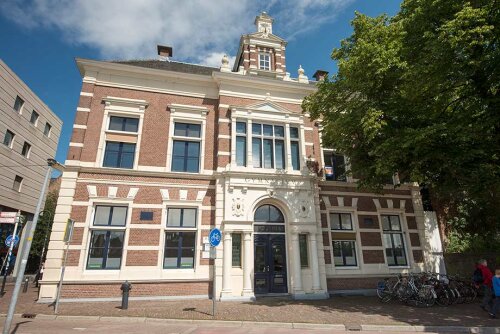Best Domestic Violence Lawyers in Delft
Share your needs with us, get contacted by law firms.
Free. Takes 2 min.
Free Guide to Hiring a Family Lawyer
List of the best lawyers in Delft, Netherlands
About Domestic Violence Law in Delft, Netherlands
Domestic violence in the Netherlands covers physical violence, sexual violence, threats, stalking, emotional abuse, financial coercion, and other forms of coercive behaviour between partners, family members, or people who live together. Delft follows national Dutch law and local practice - police, public prosecution, courts and social services work together with specialised organisations to protect victims and pursue offenders.
The legal system includes criminal sanctions for violent acts, emergency protection measures that police and prosecutors can apply quickly, and civil-family procedures for urgent arrangements about children, housing and financial support. Local organisations in Delft can help victims with immediate shelter, safety planning and connections to legal help.
Why You May Need a Lawyer
You may need a lawyer in cases of domestic violence for several reasons:
- To report and follow up a criminal case - a lawyer can explain charges, represent you with the police and public prosecutor, and represent you in court.
- To apply for or respond to urgent civil measures - such as provisional measures in family law about custody, residence and financial support.
- To obtain or extend protective measures - a lawyer can request contact restrictions or approach bans through criminal or civil routes.
- To secure housing, social benefits or emergency financial support, and to handle appeals when authorities refuse help.
- To protect your parental rights and the best interests of children - lawyers experienced in family law can help you navigate custody and visitation disputes in a way that prioritises safety.
- To access legal aid if you cannot afford a private lawyer - a lawyer can advise whether you qualify for subsidised legal assistance and help with the application.
Local Laws Overview
Key Dutch legal tools and institutions you should know about in Delft:
- Criminal law - Assault, threats, stalking, deprivation of liberty and sexual offences are criminal offences under the Dutch Penal Code. The police investigate and the Public Prosecution Service - Openbaar Ministerie - brings charges.
- Huisverbod - A temporary domestic exclusion order that can be imposed by the police at the request of the prosecutor when there is immediate danger. It typically lasts up to 10 days and aims to remove the alleged perpetrator from the home to allow the victim time to seek help and protection.
- Contact- and approach prohibitions - These can be imposed by a criminal court as part of a sentence or as a pre-trial condition, and civil courts can order similar restrictions in provisional family law measures.
- Provisional measures in family law - If you are separating or need urgent arrangements about children, the court can issue temporary orders for custody, residence, contact and financial maintenance while the main proceedings continue.
- Child protection - If children are at risk, organisations including Veilig Thuis and youth care can intervene. The court can make urgent decisions about custody and placement to protect a child.
- Legal aid - Subsidised legal assistance may be available through the Raad voor Rechtsbijstand for people who meet the income and asset criteria. Criminal legal aid can also be available for suspects and victims in some cases.
- Local institutions - Police in Delft handle immediate danger, Veilig Thuis is the local reporting and advice centre for domestic violence and child abuse, and Slachtofferhulp Nederland provides practical and emotional support to victims.
Frequently Asked Questions
What counts as domestic violence under Dutch law?
Domestic violence includes physical assault, sexual violence, threats, stalking, persistent harassment, severe emotional abuse, isolation, and financial control when committed by a partner, ex-partner, family member, or someone in the household. The law treats many of these behaviours as criminal offences or grounds for civil protection.
What should I do if I am in immediate danger in Delft?
Call the emergency number for immediate danger. If you cannot phone, seek a safe place and contact someone who can call for you. The police can intervene, remove the alleged perpetrator with a huisverbod and guide you to shelter or local support services in Delft.
Can the police remove the abuser from my home?
Yes. The police, at the request of the public prosecutor, can impose a huisverbod - a temporary house ban - that forces the suspected abuser to leave the house for up to 10 days. This measure is meant to provide immediate safety while further steps are considered.
How do I report domestic violence and what happens after I report?
You can report domestic violence to the police. After a report, police will assess safety, collect evidence, and may arrest or apply protective measures. The report goes to the public prosecutor who decides whether to prosecute. You may be offered support from victim services during the process.
What protection can I get from family court?
You can ask the civil court for provisional measures - temporary orders about custody, residence, contact with children, and financial support - while a longer procedure continues. Courts aim to act quickly when a child or adult is at risk.
Will my children be taken away if I report violence?
Reporting violence does not automatically mean children are removed. Authorities will assess risks to the children. If there is significant danger, youth care or the court may order temporary protective measures. The primary goal of authorities is the safety and best interests of the child, including keeping children with a safe parent where possible.
Can the abuser be criminally charged and what consequences could follow?
Yes. Abusive acts can lead to criminal charges such as assault, sexual offences, threats or stalking. If convicted, the offender can receive fines, imprisonment, probation, mandatory treatment, and contact or approach bans. Criminal proceedings can also support civil protection applications.
Do I need a lawyer and how do I find one in Delft?
You do not always need a lawyer, but in criminal or family court proceedings a lawyer can protect your interests, explain legal options, and represent you in court. Look for an advocaat with experience in domestic violence and family law. Contact your local bar association, the municipal social services or victim support organisations for referrals. You may qualify for subsidised legal aid.
How do I preserve evidence of abuse?
Preserve evidence promptly - take photos of injuries and damaged property, save messages and emails, keep medical records, record dates and descriptions of incidents in a safe place, and get witness statements if possible. Do not delete messages or alter evidence. Share copies with your lawyer or trusted support worker.
What support is available for victims in Delft besides legal help?
Victims can access medical care, counselling, shelters, safety planning, and emotional support. Organisations like local victim support services and national victim aid provide practical help and accompaniment through the legal process. Child and family services can help with parenting support and protection plans.
Additional Resources
Recommended organisations and institutions to contact for help or information in Delft:
- Police Delft - for immediate danger and criminal reports.
- Veilig Thuis - regional advice and reporting centre for domestic violence and child abuse; they provide anonymous consultation and make safety plans.
- Slachtofferhulp Nederland - victim support services offering practical and emotional assistance during police and court procedures.
- Gemeente Delft - municipal social services for housing, social support and local referral to shelters or care.
- Rechtbank Den Haag - the local court that handles family and civil provisional measures in the area.
- Openbaar Ministerie - the public prosecutor who decides on criminal prosecution.
- Raad voor Rechtsbijstand - body that administers subsidised legal aid for those who meet financial criteria.
- Local shelters and care organisations - emergency housing and specialised counselling for victims and children.
Next Steps
If you need legal assistance for domestic violence, consider these steps:
- Step 1 - Prioritise safety. If you are in immediate danger, call the emergency number. Move to a safe place and tell a trusted person.
- Step 2 - Seek immediate help locally. Contact the police in Delft for urgent protection and Veilig Thuis for advice and reporting of domestic violence or child abuse.
- Step 3 - Preserve evidence. Save photos, messages, medical reports and a record of incidents in a secure place.
- Step 4 - Get medical and emotional support. Visit a healthcare provider for injuries and use victim support services for emotional and practical help.
- Step 5 - Consult a lawyer. Ask for a lawyer experienced in domestic violence and family law. Discuss criminal reporting, huisverbod requests, provisional family measures and whether you qualify for legal aid.
- Step 6 - Consider immediate legal measures. With police or a lawyer you can explore a huisverbod, criminal reporting, and provisional family court orders for child custody and financial support.
- Step 7 - Follow up on support and safety planning. Work with municipal services, victim support and social services in Delft to arrange shelter, financial help and long-term safety planning.
Important note - This guide provides general information about domestic violence law and resources in Delft, Netherlands. It is not a substitute for legal advice. For advice tailored to your situation, contact a qualified lawyer or an authorised local support organisation.
Lawzana helps you find the best lawyers and law firms in Delft through a curated and pre-screened list of qualified legal professionals. Our platform offers rankings and detailed profiles of attorneys and law firms, allowing you to compare based on practice areas, including Domestic Violence, experience, and client feedback.
Each profile includes a description of the firm's areas of practice, client reviews, team members and partners, year of establishment, spoken languages, office locations, contact information, social media presence, and any published articles or resources. Most firms on our platform speak English and are experienced in both local and international legal matters.
Get a quote from top-rated law firms in Delft, Netherlands — quickly, securely, and without unnecessary hassle.
Disclaimer:
The information provided on this page is for general informational purposes only and does not constitute legal advice. While we strive to ensure the accuracy and relevance of the content, legal information may change over time, and interpretations of the law can vary. You should always consult with a qualified legal professional for advice specific to your situation.
We disclaim all liability for actions taken or not taken based on the content of this page. If you believe any information is incorrect or outdated, please contact us, and we will review and update it where appropriate.









